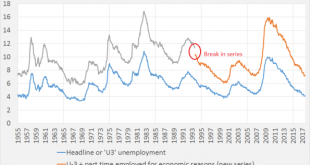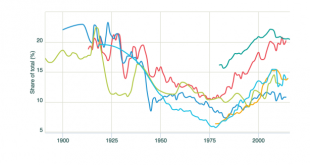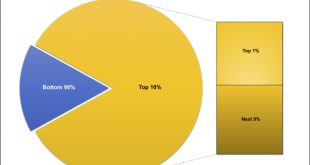Source: Bureau of Labor Statistics Broad unemployment today is, compared with the period before 1994, worse than you think. A new way of estimating ‘part time workers for economic reasons’ shifted this series downward with almost 1% of the labor force. To gain a proper understanding of historical developments present day data have to be increased or historical data have to be decreased a little. I’m trying to write a book about the relation between economic statistics and neoclassical...
Read More »Oil, gas and coal 2040 (4 graphs)
2017
Read More »Utopia and inequality
from David Ruccio Economic inequality is arguably the crucial issue facing contemporary capitalism—especially in the United States but also across the entire world economy. Over the course of the last four decades, income inequality has soared in the United States, as the share of pre-tax national income captured by the top 1 percent (the red line in the chart above) has risen from 10.4 percent in 1976 to 20.2 percent in 2014. For the world economy as a whole, the top 1-percent share...
Read More »Bribe offers for academics
from Edward Fullbrook Norbert Häring’s story about misleading academic research reminds me of another story. Big-money offering bribes to academics is, I suspect, more common than people, including academics, realize. I first encountered the practice when I was an undergraduate. My university’s most popular course, “Insurance”, was taught by an economics professor whose students affectionately called Doc Elliot. He taught not only how the insurance industry purported to work, but also...
Read More »CEPR vs. NBER: Two approaches for dealing with false research in favor of tuition fees
from Norbert Häring For international readers, I would like to summarize a piece on false economic research supporting tuition fees, which appeared in German in Handelsblatt on 19 February. As interesting as the fake research itself is the differing reactions of the two main channels, which had been used to publicize it: One was the prestigious Working Paper series of the National Bureau of Economic Research in the US The other was the well-read platform Vox (voxeu.org) of the...
Read More »Science and the quest for truth
from Lars Syll In my view, scientific theories are not to be considered ‘true’ or ‘false.’ In constructing such a theory, we are not trying to get at the truth, or even to approximate to it: rather, we are trying to organize our thoughts and observations in a useful manner. Robert Aumann What a handy view of science. How reassuring for all of you who have always thought that believing in the tooth fairy make you understand what happens to kids’ teeth. Now a ‘Nobel prize’ winning...
Read More »Where does inflation hide?
from Herman Daly The talking heads on the media explain the recent fall in the stock market as follows: A fall in unemployment leads to a tight labor market and the prospect of wage increases; wage increase leads to threat of inflation; which leads the Fed to likely raise interest rates; which would lead to less borrowing, and to less investment in stocks, and consequently to an expected fall in stock prices. Therefore investors (speculators) rush to sell before the expected fall in stock...
Read More »What, us worry?
David Ruccio Ed Wolff is right: For the vast majority of Americans, fluctuations in the stock market have relatively little effect on their wealth, or well-being, for that matter. That’s because, as his research shows (and as I illustrate in the chart above), the bottom 90 percent of Americans own (either directly or indirectly) a tiny share—16 percent—of total stock value in the United States.* The rest is owned by the top 10 percent: 40.3 percent by just the top one percent (with a...
Read More »The debate continues in the same absurd, polarized and simplified form.
from Neva Goodwin One of the outstanding features of the time in which we live is the terrifying prospect of global climate change, regarding which it has been said that contemporary humankind is suffering from “Pre-Traumatic Stress Disorder”. Whether we squarely face what this will likely mean for the coming years, or whether we simply can’t bear to look at the facts, it is getting ever harder to avoid the gut-knowledge that the world is rapidly becoming markedly less beautiful, rich...
Read More »The future — something we know very little about
from Lars Syll All these pretty, polite techniques, made for a well-panelled Board Room and a nicely regulated market, are liable to collapse. At all times the vague panic fears and equally vague and unreasoned hopes are not really lulled, and lie but a little way below the surface. Perhaps the reader feels that this general, philosophical disquisition on the behavior of mankind is somewhat remote from the economic theory under discussion. But I think not. Tho this is how we behave in the...
Read More » Real-World Economics Review
Real-World Economics Review






